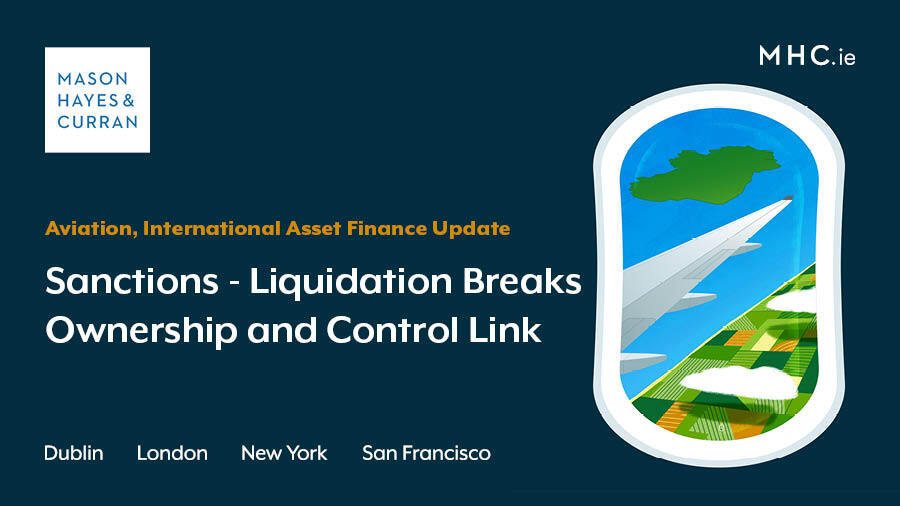Sanctions - Liquidation Breaks Ownership and Control Link

EU sanctions imposed since the Russian invasion of Ukraine, mean that an EU subsidiary of a sanctioned Russian company is also subject to sanctions. An Irish High Court judgment makes it clear that an official liquidator can deal with the assets, for the benefit of non-Russian creditors, without applying for derogations. Our Aviation, International Asset Finance team examines the implications of this decision.
The Irish High Court has determined that the liquidation of an Irish aircraft leasing company, which was a 100% subsidiary of a Russian company expressly subject to EU sanctions, rebuts the presumption that the Irish company was controlled by the Russian parent for the purpose of EU sanctions.
This enables the liquidators to deal with the assets without costly and time-consuming sanctions derogation applications.
Background
Joint Stock Company GTLK (GTLK) is incorporated in the Russian Federation and is listed in Annex 1 to EU Regulation 269/2014 concerning restrictive measures in respect of actions undermining or threatening the territorial integrity, sovereignty and independence of Ukraine (the Asset Freeze Regulation).
GLTK Europe DAC (GTLKE) and GTLK Europe Capital DAC (GTLKEC) (together the “Companies") are subsidiaries of GTLK. GLTK’s ownership raised a presumption that the Companies and their assets were controlled by GTLK and were therefore subject to sanctions.
The EU Commission’s FAQ on the Asset Freeze Regulation provides:
“This presumption can be rebutted on a case by case basis by the entity concerned, if it can be demonstrated that some or all of its assets are outside the control of the listed person, and/or that funds or economic resources made available to it would in fact not reach or benefit the listed person.”
It is understood that, before their liquidation, the Companies applied for and obtained derogations from the Central Bank of Ireland (CBI) one of the designated competent authorities in the State for the purpose of the Asset Freeze Regulation, permitting the sale of a number of aircraft.
Winding up orders were subsequently made by the High Court in respect of the Companies.
The joint liquidators sought a number of confirmations from the CBI, including, crucially, confirmation that once liquidators were appointed the Companies should no longer be treated as subject to an asset freeze. The liquidators expressed the view that a requirement to submit detailed applications for authorisations to the CBI for each individual transaction would result in a crippling administrative burden, inordinate delays and an unreasonable amount of legal costs, all to the detriment of non-sanctioned entities such as bondholders and other creditors of the Companies.
The CBI initially took the position that the liquidators would need to apply for a derogation in respect of each transaction.
The Liquidators’ Motion
Consequently, the liquidators issued a motion seeking declarations that:
- the presumption of control was rebutted as a result of the appointment of the liquidators;
- the assets of the Companies are under the control of the liquidators who are the only persons entitled to deal with them;
- on the appointment of the liquidators, the Companies ceased to be the beneficial owners of their assets which are held on trust to apply them in discharge of the Companies’ liabilities;
- if there are surplus funds in the liquidation, these should effectively be frozen; and
if necessary, an order directing that the assets of the Companies vest in the liquidators.
The Order and Judgment
On the day after the hearing, the Court made orders, substantially in the form sought by the liquidators and said that it would deliver its reasons later. On 31 July 2023, the Court delivered its written judgment.
Having considered various provisions of the Companies Act 2014, the Court held that:
“The combined effect of all these provisions is to deprive directors or other officers of the company of the control which in the ordinary course is entrusted to them by virtue of their appointment over the affairs of the company. Equally for shareholders the loss of control is absolute.”
And
“I have no hesitation in those circumstances in making a declaration that the presumption of control for the purposes of Article 2 of the Asset Freeze Regulation, and which is identified in the Commission’s FAQs last updated on 6 July 2023, is conclusively rebutted by the order for the winding up of the Company and the appointment of the Joint Liquidators.”
Having considered Irish case law, and some of the English case law cited in those cases, the Court then set out the principles of the statutory trust:
“When regard is had to the priority which Section 618 confers on creditors over shareholders, the logic for all those statements as to beneficial ownership and the use of the term “statutory trust” is clear. The principles may be summarised and applied to this case as follows:
- On the appointment of the Joint Liquidators the Companies ceased to be the beneficial owners of their assets;
- The assets are held by the Companies, now under the control and authority of the Joint Liquidators, on trust for their creditors;
- The duty of the Joint Liquidators is to get in and realise the assets and apply their proceeds in accordance with the scheme of priorities prescribed by the Companies Act 2014;”
Comment
In our view, the EU sanctions were not intended to prevent the outflow of cash or assets from Russian owned or controlled companies to the benefit of non-Russian creditors. Accordingly, collateral adverse effects in this regard should be minimised.
This judgment should minimise the collateral damage to non-Russian creditors of the Companies.
In particular, creditors will welcome this judgment because it should enable the liquidators to expeditiously realise the assets, which were valued at €4.1 billion shortly before liquidation. Moving quickly is essential to maximise the return to creditors, where aircraft which are not being maintained will diminish in value.
More broadly, this judgment should provide clear guidance for future liquidations of Irish subsidiaries of sanctioned Russian companies. Given the similarities between the company law of England and Ireland it is also likely to be a useful persuasive precedent in the UK and potentially other common law jurisdictions.
For more information, please contact a member of our Aviation, International Asset Finance or Restructuring & Insolvency teams.
The content of this article is provided for information purposes only and does not constitute legal or other advice.
Share this:




